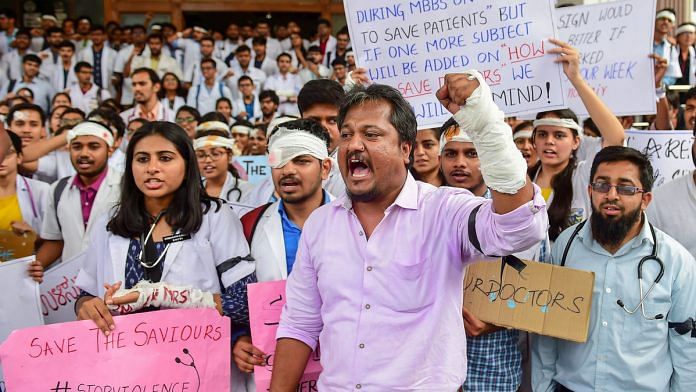New Delhi: Nationwide protests by doctors to condemn violence against their peers in West Bengal entered its fourth day Friday. The agitation, which spread to Delhi, Mumbai, Hyderabad, Bengaluru and other cities, has made one thing clear — laws currently in place to protect physicians from attack by patients or their families are simply not working.
At least 19 states — including West Bengal, the epicentre of the protests — have passed what is called the Protection Of Medicare Service Persons And Medicare Service Institutions (Prevention Of Violence And Damage To Property) Act, also known as the Medical Protection Act (MPA).
The Act, covering doctors affiliated to institutions as well as independent practitioners, outlaws attacks against physicians and damage to their property. Offenders can get a jail term of up to three years and a fine of Rs 50,000.
As stringent as it sounds, the Act, however, fails to really protect doctors because it features neither in the Indian Penal Code (IPC) nor in the Code of Criminal Procedure (CrPC). This makes it difficult for victims to approach the police for help or the latter to file a complaint against suspects.
“Without any provision in the IPC, filing a case can sometimes mean taking a copy of the Act to the police because she or he may not even know about it,” said Dr Neeraj Nagpal, convener and managing trustee of the Medicos Legal Action Group in Chandigarh.
“Police may not even be sure under which section to file such a case,” he added.
Also read: 15-hour shifts, no sleep or water: India’s resident doctors cry ‘I Am Overworked’
Rising number of cases
Doctors have long been demanding that a central law be put in place instead of a state-wise MPA as well as adequate security at hospital premises.
“I have lost count of the number of requests we have made for a central law”, Dr Rajan Sharma of the Indian Medical Association told ThePrint.
“Protests only take place after attacks happen and it has been impossible for us to keep track of the rising number of such cases,” he said.
In 2017, the IMA released a study that found 75 per cent of doctors faced some form of violence while on duty. “Violence is not just physical. We also face verbal abuse almost every day. I have even been forced to call the police several times,” said Dr H.L. Nag, a sports doctor at All India Institute of Medical Sciences.
Doctors also fear that intermittent attacks on physicians may stop people from taking up the profession.
“The number of doctors vis-a-vis the number of patients is already less in hospitals across the country. We skip food and work without taking breaks to cater to patients. With news about attacks against doctors on the rise, more and more people are leaving the profession,” added Dr Nag.
Resident doctors and those practicing in rural areas are most at risk of being “violently attacked”, Dr Nagpal said.
Demands and resistance
Implementation of a central law is not possible since the area of health — including protection of doctors — is a “state subject”, meaning only states have the power to frame and pass laws related to it.
Barring the Pre-Conception and Pre-Natal Diagnostic Techniques (PCPNDT) Act, 1994 — making prenatal sex determination illegal — the central government does not intervene in any health laws.
“Why is the PCPNDT Act a central one? It is because the authorities saw a unique problem that could be better monitored and remedied by a central law. The situation is same when it comes to violence against doctors,” said Dr Nagpal.
The IMA too stands firmly with the protesting doctors and echoes demand for a central law and better security of physicians.
“Violence is unacceptable. We want our community to be left alone so that we can do our jobs safely,” said Dr Sharma.
Also read: Health ministry gets Dr Harsh Vardhan as boss, now he needs to find doctors for rural India



